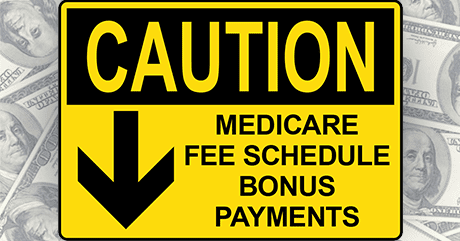Medicare Bonus Payments Expire- What’s Next?
December 31, 2017, 2359 Hours…
When the New Years ball begins its drop in New York City on December 31, 2017 at 2359 hours, so will the Medicare Fee Schedule Bonus Payments drop.

Those of you who operate in urban zip codes will see 2% less, rural zip codes 3% less and super rural services less 22.6% plus everyone in the rural and super rural areas will see 50% less mileage reimbursement for the first 17 miles of each trip.
Now before you all suffer the “big one,” all of this appears to be temporary.
How temporary? Well…we’re not sure.
January 19
According to an advisory sent out by the American Ambulance Association (AAA) to all of its members nationwide, there remains strong bipartisan support for reinstating the bonus payment extenders when Congress returns from the holiday recess next month. The anticipation is that the extensions will be added to the next government funding legislation which must be passed by January 19th in order for the Federal government to keep their doors open.
Unfortunately, Congress was too busy slapping each other on their backs over passing tax reform and failed to take up the extensions prior to the Christmas break. Of course, we all find that somewhat disturbing but then again we’re sure you’ll agree that this is no surprise to any of us who have monitored the progress of these issues for many years.
Be Proactive!
So, where are we? The fact is, the bonuses will lapse and the reality is reimbursement will potentially drop. There’s nothing anyone can do about it at this point other than ring the phone and the e-mail inbox of your district’s Federal legislators to remind them that you and your vote are watching what they do in support (or failure to support) extending these EMS payments.
Be proactive!
In addition to lobbying Congress, make a plan.
Many of our clients hold claims in the New Year for several weeks in an attempt to side-step getting hit with the annual deductible. Especially those ambulance services that legally conduct a subscription or club type program follow this course of action. Beyond the deductible consideration this year, is the strategy of holding claims until Congress has time to act on the bonus payments to avoid being paid a lesser amount initially requiring a retroactive payment adjustment following Congressional action on the matter, later on.
Of course, when considering putting a hold on 2018 Medicare claims, each EMS agency must factor in the cash flow hit to your short-term bottom line. If your agency does not have the wherewithal to accommodate such a hit, then it may not be a wise move. But, if you’ve put some money away for the proverbial rainy day, then now may just be the time to operate off some of the reserves with the intent to replace the nest egg when all of this has been fixed.
CMS May Force Things
Being prepared may just be something you want to think about anyway. CMS may just force the issue and may ask their Medicare Administrative Contractors (MACs) to hold paying claims as they did in 2014 when they found errors in the final fee schedule that year.
The AAA astutely points out that paying and fixing claims retroactively is expensive, so it will be interesting to see how they handle this situation. Will they pay the claims and then expect us to re-submit for additional payment or will they instruct the MACs to automatically reprocess claims for additional payment?
Either way, for all of us in the billing office it creates a bit of a mess for those in posting…plus, those of you who base your gross charges in some formula based on the Medicare approvals are further in limbo. And…then there’s the issue of reports not reflecting any reliable reimbursement expectation for budgeting and forecasting purposes.
Mini-Rant…
We close this discussion with a mini-rant.
We don’t know about you but this office is plum tired of the ambulance industry in the United States being an afterthought. Federal emergency planners talk all the time about the vital role of Fire/EMS and First Responder resources in disaster and mass casualty/terrorism preparedness. Yet when it comes to funding, we wish the same amount of urgency would be recognized by the real decision-makers in Congress.
To underfund EMS, even for a fraction of time, is unacceptable. Someone in Washington D.C. needs to wake up and see America’s Fire/EMS front lines in a clear perspective when it comes to funding.
We’ll put that on our New Year’s wish list!